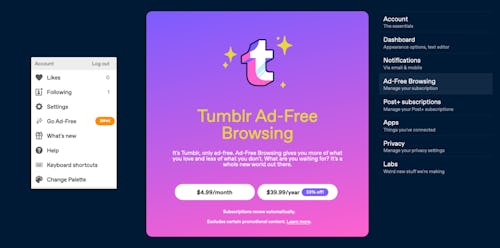
Let’s pretend, for just a moment, that it’s mid-2012. You scroll your Tumblr feed aimlessly in the summer heat; it’s a very strange mix of Olympics GIFs, screenshots of old Skins episodes, and full-on pornography. Life isn’t all that bad.
Then, in early September, everything changes. Between your usual #aesthetic posts are a bunch of random ads. The advertisements are suddenly everywhere. They interrupt your scroll flow in the worst way.
Introducing in-feed ads wasn’t the worst thing Tumblr ever did (cough adult content ban cough), but they did alter the blogging experience on the site somewhat. Now, just about a decade after their first introduction, Tumblr is finally letting users opt out of the advertising experience altogether.
For $4.99 each month, bloggers can now enjoy an entirely ad-free Tumblr experience. Those who are truly serious about removing ads forever can also pre-pay for a full year at just $39.99, which amounts to about four months free over the 12-month period.

Par for the course —
Is paying for Tumblr an exciting prospect? Not even a little bit. Tumblr has always been free. That’s one of its biggest selling points. Some people create full personal websites and portfolios on Tumblr for that very reason.
As far as pay-to-use-without-ads platforms go, though, Tumblr’s pricing is very much average. This model has become very popular in mobile apps especially; use the software for free, if you want, but you’ll probably end up spending significant amounts of time watching low-budget ad videos. Pay a one-time or monthly premium and never worry about it again.
There’s a reason this model is being adopted across internet markets: It puts the power in users’ hands. If you don’t feel like paying, go ahead and continue using the site for free. Pay up if you want the ads gone. Either way Tumblr comes out with revenue.
Is anyone even using Tumblr? —
Yes, of course. Enough that the company is still releasing significant new features, like the ability to put your posts behind a paywall. As of now, Tumblr hosts more than half a billion blogs. That’s a lot of blogs.
Tumblr has, in recent years, actually seen a renaissance of sorts, as social media users realize Twitter, Facebook, and Instagram are all incredibly toxic. Not that Tumblr doesn’t have its quirks and issues. (If you read to the end of Tumblr’s announcement post, you’ll see mention of “blorbos.” Yes, Tumblr is still like that.)
If you’re ready to opt into the ad-free subscription, you can head over to your Account Settings (on the full website, not the app) and select the “Go Ad-Free” menu.






